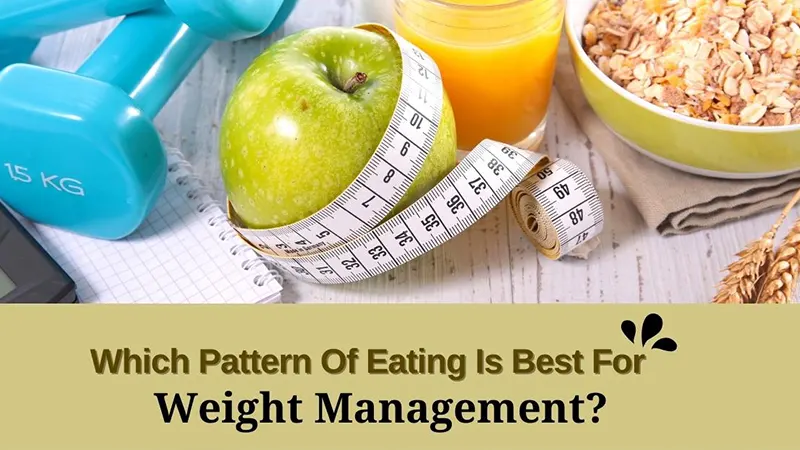Which Pattern of Eating is Best for Weight Management?

With the rapid growth in obesity cases worldwide, it has become important to maintain a healthy weight. And the best way to manage weight does not mean working out or starving yourself, but it is a healthy and balanced combination of the two. However, weight management does not only mean losing weight but also maintaining a healthy weight. It is a long-term procedure that requires good eating patterns and deliberate efforts.
Food nutritionists have mentioned that we should eat varieties of food to get the full spectrum of nutrients needed for a healthy body. Adding vegetables and fruits to your diet is important, but it only provides a few calories. Similarly, dairy products will have little effect on your body fat. You should also add meat, but not too much. Therefore, creating a balanced diet is a complex process.
After knowing all this, you may be concerned about which pattern of eating is best for weight management and how effective it really is. Well, drop all your weight management concerns now! We have created this ultimate weight management guide which will answer all your concerns regarding weight management and eating patterns. So, firstly, it is essential to know what weight management is and why it is so important for an individual.
What Is Weight Management?
Weight Management is a set of behaviors and practices essential to retaining one’s weight at a healthy level. It is preferred to the term “dieting” as it includes something more than balancing food intake or care of obese people. People detected with eating disorders who are not overweight or obese also require to exercise weight management. Some healthcare experts use “nutritional disorders” to cover every disorder connected to weight.
In recent years, experts and researchers have found that almost all the negative health outcomes of obesity are controlled or improved by a relatively moderate weight loss. It is not essential to reaching a person’s ideal “weight” through weight management. Some nutritionists counted this treatment as only 10% effective. Also, most obese people who lose weight from lower-calorie diets regain it in the next five years, which has led nutritionists to intensify weight management rather than weight loss-like suitable treatment outcomes.
Importance of Different Meals for an Optimal Weight Management
An average human needs to eat at least three meals a day. And those three meals are breakfast, lunch, and dinner. These meals are important as they are the power source for everyday activities. Skipping even one can create a misbalance in your body, leading to weight fluctuations. So, let’s take a look at why these meals are so important and what is the best time for you to eat.
Breakfast
If you break the word “Breakfast,” we would get (break and fast), which means breaking the fast of a night. Breakfast is the most important meal of your day because it generates the nutritional level in your body for the whole day and gives you the energy to face everything coming your way the entire day. The calories you eat during your breakfast will keep you full for longer, which then reduces the number of calories ingested in 24 hours.
Having breakfast within the next hour of waking up is good. Because skipping your morning meal can make you feel lazy and drained, eventually taking you to some chips or a candy jar, which is unhealthy. Having breakfast early in the morning doesn’t mix with lunchtime, giving you enough of a gap between the two.
Regular breakfast at the proper time surely helps you in weight management. According to a study, it has been found out that 78% of people who eat regular breakfast are able to maintain their body weight better. And in another study, it has been verified that people who usually skip breakfast are more likely to gain weight and become obese.
Lunch
Lunch is a meal which we have in the middle of the day. You should eat your lunch about 4 to 5 hours after your breakfast. For instance, if you have your breakfast at 8 in the morning, you should eat lunch at around 1 p.m. Also, if you are unable to eat your lunch before 2 in the afternoon, make sure to eat some snacks and not wait till dinner time to eat something. Your snacks should blend carbohydrates and protein to keep you feeling full till your next meal. It can include a bowl of veggies with at least 25% of hummus or a light cheese stick with fruit. These snacks will keep your energy levels up while also fulfilling all your body’s requirements.
Dinner
People tend to overeat during dinner time because they often skip one of the other two meals during the day. But you should remember that your night’s meal or dinner follows the same timing pattern as the earlier meal, with a gap of 4 to 5 hours. So, if you ever skip a meal before your dinner, make sure to always eat some healthy snacks in between and keep you energetic and healthy.
These snacks help curb your appetite and encourage you to eat light during the last meal of your day. Having a healthy dinner improves digestion, reduces fat storage, and promotes good sleep.
Read also:- How To Improve Metabolic Health & Foods That Help in It?
Types of Diet You Can Follow For Weight Management
There is no one type of diet that is a perfect fit for everyone. So, here are five types of diets that you can follow while you lose weight.
Low-Fat Diet
A small amount of fat carries more calories than protein or carbohydrates. To lower your calorie intake, you should eat a very small amount of fat-containing foods (such as red meat, cheese, processed food, butter, etc.) because excess fat intake can make you obese. A low-fat dietary composition typically consists of a minimum of ≤10% of calories from fat. Its moderate level is ≤30% of calories from fat and < 7% – 10% from soaked fatty acids. (Kim, 2021)
A study suggests that high-fat diets and saturated fatty acids can adversely affect the stomach microbiota, which is related to unhealthy metabolic conditions. Also, it can become the reason for obesity and long-lasting inflammation.
Thus, low-fat diets or diets with high fiber and healthy-fat intake tend to be more fitting and beneficial for obese people. These diets can assist you with weight management and lower the risk of heart diseases and cancers like breast cancer and colorectal cancer.
Low-Carbohydrate Diet
Low energy and weight gain after successful weight loss is the most common problem people face when trying weight loss methods or techniques. Thus, substitutes of dietary procedures for weight management have become a curiosity among healthcare professionals and researchers.
Low-carbohydrate diets are widely used for weight reduction. This diet includes a smaller intake of carbohydrates under the lower boundary of the macronutrient distribution scale for healthy grown-ups (45%–65% of total daily energy). (Kim, 2021)
A systematic report and analysis that studied 14 dietary macronutrient figures revealed that most macronutrient foods result in average weight loss over six months. The study also shows that low carbohydrate and high protein intake is effective for significant weight loss within 6 to 12 months after you start your diet plan. According to one recent report, the Mediterranean diet gives the most consistent benefits for the development of cardio metabolic boundaries and weight loss. You should remember that eating sufficient protein is essential in calorie limitation for maintaining muscle mass, irrespective of your diet.
Ketogenic Diet
The ketogenic diet consists of large amounts of protein and fat and limits the amount of carbohydrate intake (< 50 g/day). This diet might increase lipolysis and decrease your appetite, which can then lead to significant metabolic regulation for fat consumption. It can also provide similar thermic effects to proteins. There are various carbohydrate-restricting diets, and some limit the number of carbohydrates to particular levels without completely restricting dietary fat and protein (like the Atkins diet). In contrast, other diets will allow you to eat an adequate amount of carbohydrates and average fat and protein intake.
As per the study, the ketogenic diet can suppress hunger in calorie-restricting diets and may also have some remedial effects on polycystic ovary syndrome, T2DM, and Neurological and Cardiovascular diseases.
High-Protein Diet
Intake of a high protein diet is very popular and is a promising way to improve fullness and for losing weight or fat mass. According to Dietary guidelines for adults, you should eat about 46–56 g or 0.8 g/kg of ideal body weight every day. It is regarded as a high-protein diet when it crosses the limit of 0.8 g/kg/day.
The Atkins diet is a low-carbohydrate, non-energy-restricting, high-fat, and high-protein diet. Moreover, a high-protein diet with an average carbohydrate intake is good for you if you want to improve your metabolic boundaries.
Mediterranean Diet
The Mediterranean Diet includes:
- Increased vegetable and fruit intake.
- Eating fish and dairy products.
- Adding poultry products to the meals.
- And a very low intake of red meat.
It has been widely proven that the Mediterranean Diet greatly prevents cardiovascular disease and helps in losing weight. Moreover, this diet helps in reducing the chances of digestive cancer and dementia. It might also improve your cognitive functions.
The Mediterranean Diet focuses on adequate nutrients, vegetables, fish, and healthy fats. It makes this a very good diet plan for long-lasting weight reduction. Moreover, low-carbohydrate and low-fat are the initials of weight management. A ketogenic diet is an alternative to the Mediterranean Diet.
Evidence-Found Dietary Guidance
The 2020 American-based Dietary Guidelines provide evidence-based suggestions to balance the intake of calories with exercise to manage weight. So, here is an eating pattern you can follow, including food and beverages that can help you maintain your calorie level.
-
- Varieties in vegetables from all subgroups ( starchy, dark green, red and orange, legumes like peas and beans)
- Fruits ( especially the whole fruit rather than the portion of it )
- Grains (50% percent of the whole meal)
- Various protein-rich foods like eggs, seafood, poultry, lean meats, legumes like peas and beans, seeds, nuts, and soy products.
- Low-fat or fat-free dairy, including cheese, yogurt, milk, and fortified soy drinks.
- Oils, including oils in foods and vegetable oil, like nuts and seafood
A healthy food eating pattern also checks several elements of general well-being analysis in the U.S:
- The total sugar consumption per day should be less than 10%
- Intake of less than 10% of calories every day from soaked fats
- The consumption of sodium should be less than 2,300 mg (milligrams) per day.
- You should always consume alcohol in moderation. The appropriate limit of drinking is one drink for females and two for males per day while keeping in mind the legal drinking age for adults.
Weight Management Strategies
If you intend to maintain a healthy weight, you need weight management strategies. So, to create a weight management plan with a more productive and positive mindset, here are some strategies that you can try:
Calorie Count
To maintain a balanced weight, you have to use more calories to lose weight than you take in. You should reduce your calorie intake by 500-1,000 calories a day to drop about 1 to 2 pounds a week, as one pound is about 3,500 calories.
Track Your Intake
Based on a study, noting down what you eat in a day is also an effective technique for weight loss. It increases your awareness and pushes you to think about what amount of food you have eaten. Because in a good and balanced diet, every bite and sip counts. Also, you can use tracking (a web-based app), a productive tool for keeping track of your eating patterns and habits. Through the Tracking app, you can set new goals and create a suitable diet plan.
Stay a Day Ahead of Your Meals
Planning your meal ahead of time is important. With our busy schedules, it is a possibility that you won’t get enough time to plan a well-balanced meal at the last moment. Create a basic menu of healthy food before shopping and create a wholesome meal out of it.
Avoid “Bottom Heavy” Diets
Distribute your calories throughout the day instead of consuming most of them after sunset. It will assist you in preventing serious fluctuations in blood sugar, keeping your metabolism fired up. And it will further keep your food portions controlled the whole day.
Mind Your Meals (And Snacks) and Ride Out Cravings
The term ‘Mindful’ around food stands for how truly focused you are on what to eat. If you eat out of “habit,” not by “hunger,” then you are eating way more than you realize. Eating a meal when you are hungry instead of doing it out of boredom will help you trim and cut back 500 calories every day in no time.
If you think you’re eating habit is pulling you to your next bite, go for a walk or distract your mind with some of your favorite activities.
Think Your Drinks
Don’t spend your day drinking away your calories. Beverages such as sweet teas, juice, soda, flavored coffees, and energy drinks can significantly increase your calorie intake every day. Instead, you should increase your water intake, and if plain water is not your thing, mix it with some lime or lemon. You can also try a calorie-free flavored seltzer. Further, you can count your cocktails too. Alcohol is heavy in calories, even before you mix it with something else, so you should avoid drinking it or keep it to a minimum.
Conclusion
A specifically created diet plan that best suits your needs is important to bring your weight to a healthy level, and it includes both weight loss and weight gain. Your weight management does not have to be boring. If you plan to create a balanced diet that is not limited to just broccoli or kale, you can go to a professional for your diet plan. A professional can help you bring dietary variations based on your body’s requirements and needs. Also, they can help you find the right food with the right amount for your body type.
To get the best weight management plan that helps you reach your goal, visit Apprize Medical today. We have experts and professionals who take into account all your medical history, diagnose properly, and then create a plan that best fits your needs and body type. Our team offers evidence-based solutions and has first-class technology to help you with your problems. To know more, feel free to call us at +1-305-851-2132 and book an appointment to live a healthy life.
Frequently Asked Questions
- What is the best eating routine to lose weight?
The gap between every one of your meals should be between 4-5 hours. However, the gap between dinner and the next morning’s breakfast should be about 12 hours because it will help you with your weight loss, metabolism functioning, management of hunger and appetite, and fat burning.
- What is the best eating pattern?
The best eating pattern includes eating your breakfast, lunch, and dinner. And to maintain a healthy diet, you can include vegetables like dark green, red, and orange in the day’s three meals. Also, you can add some healthy fruits, high-fiber cereals, bread, and whole grains to your food plan for a balanced diet.
- What are five foods that can help you with weight maintenance?
The five foods that can help you keep your weight in check and create a balanced diet includes:
- Cereals and grains
- Fruit
- poultry, lean meat, eggs, fish, legumes (beans), nuts, tofu, seeds
- legumes (beans) and vegetables
- Yogurt, cheese, milk, or alternatives
- What is the role of nutrition plays in weight management?
Nutrition is a vital element in long-lasting weight management. No matter what dietary pattern you follow, nourishing and balancing a calorie deficiency is essential. A certified dietitian can assist you in the evaluation of your macronutrient, caloric, and micronutrient requirement within a culturally suitable structure to help with weight management.
- What is the healthiest approach to losing weight?
Attaining healthy weight loss is not always about a “diet” but a lifestyle with daily physical activity, well-eating patterns, and stress management. Several factors can cause weight gain, including diseases like thyroid and diabetes, medications taken for several other health conditions, overeating, and your genes.







